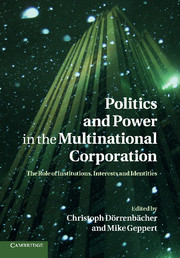 Politics and Power in the Multinational Corporation
Politics and Power in the Multinational Corporation Book contents
- Frontmatter
- Contents
- List of figures
- List of tables
- Notes on contributors
- Foreword
- Part I Introduction
- Part II Politics and power in MNCs: institutions, social embeddedness and knowledge
- Part III Politics and power in MNCs: headquarters–subsidiary relations
- Part IV Politics and power in MNCs: role of national identities and identity work
- Part V Conclusions
- 13 Reflections on the macro-politics of micro-politics
- Index
- References
13 - Reflections on the macro-politics of micro-politics
Published online by Cambridge University Press: 26 April 2011
- Frontmatter
- Contents
- List of figures
- List of tables
- Notes on contributors
- Foreword
- Part I Introduction
- Part II Politics and power in MNCs: institutions, social embeddedness and knowledge
- Part III Politics and power in MNCs: headquarters–subsidiary relations
- Part IV Politics and power in MNCs: role of national identities and identity work
- Part V Conclusions
- 13 Reflections on the macro-politics of micro-politics
- Index
- References
Summary
Introduction
The study of politics and power inside multinationals has made significant strides over the last decade. No longer is it possible to treat MNCs simply as rational unitary actors pursuing efficiency logics in competitive markets and selecting appropriate forms of organizational structure depending on the contingent characteristics of particular sectors. Instead, we now have a view of MNCs as consisting of different types of social actors with differing interests and power derived from their distinctive institutional origins. These interests and powers are embedded within the particular strategic and operational positions that subsidiaries and actors occupy within the MNC and the places which they take up within global value chains. In turn this is embedded in the dynamics of global competitive markets that provide the performance outcomes crucial to the survival and growth of firms. Internally, therefore, MNCs are shaped by the ways in which different actors are constituted as collective interests and identities by these processes and how they interact with other actors inside and outside the MNC. From this perspective, the MNC is neither a Weberian rational legal bureaucracy nor an “internal market” but rather a “contested terrain” (Collinson and Morgan 2009; Edwards and Bélanger 2009). Many of the chapters in this book and other recent papers by the editors and authors have contributed substantially to extending our understanding of these processes (Becker-Ritterspach and Dörrenbächer 2009; Blazejewski 2009; Dörrenbächer and Geppert 2006, 2009; Gammelgaard 2009; Geppert et al. 2003; Geppert and Matten 2006; Geppert and Williams 2006).
- Type
- Chapter
- Information
- Politics and Power in the Multinational CorporationThe Role of Institutions, Interests and Identities, pp. 415 - 436Publisher: Cambridge University PressPrint publication year: 2011
References
- 22
- Cited by
